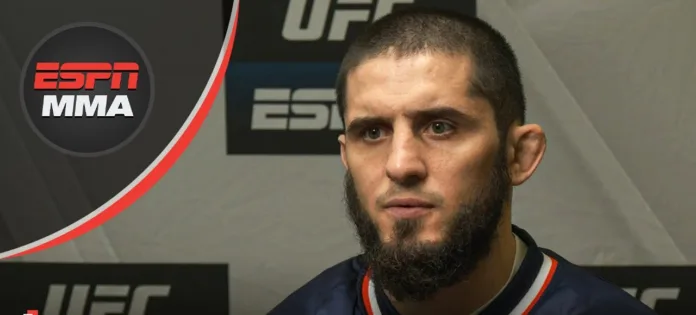As Islam Makhachev prepares to defend his lightweight title at UFC 302, he addresses Dustin Poirier’s chances and the impact of Khabib Nurmagomedov’s return to his corner
Islam Makhachev has expressed respect for Dustin Poirier, even though he believes Poirier stands no chance against him at UFC 302. The reigning lightweight champion prepares to defend his title on Saturday in New Jersey, facing Poirier, who earned the opportunity with a single win over Benoit Saint-Denis in March.
Makhachev views Poirier as the same fighter who faced Khabib Nurmagomedov in 2019, only five years older. “Honestly, he’s the same,” Makhachev stated during UFC 302 media day. “He doesn’t believe he can beat me. His coach doesn’t believe he can beat me. I know I can make this fight easy. I will finish him because I am on a different level. I am the best fighter in the world right now.”
While Makhachev admires Poirier, he remains confident in his own abilities. He acknowledged Poirier’s skills as a striker but emphasized the advantages his own MMA style brings. “Honestly, my style is the worst style for him,” Makhachev explained. “He can beat some strikers. He’s one of the best strikers in this game, but we’re not strikers. We’re MMA fighters. My skills are on a different level. I can strike with him, but if I want to make this fight easy, I know the way and everybody else knows the way. Always when his opponent pressures him, takes him down, he has the same problems always.”
In addition to his confidence, Makhachev gains further advantage with Khabib Nurmagomedov returning to coach and corner him for the fight. Nurmagomedov, a retired UFC Hall of Famer, had stopped cornering teammates more than a year ago to focus on his family and businesses. His return to Makhachev’s corner is significant.
“This means a lot,” Makhachev said about Nurmagomedov’s return. “This is like [adding] to striking 20 percent, to wrestling 20 per cent, to the plan. It’s always great to have Khabib in the corner. He gives me good advice in a lot of fights. With Gleison Tibau, he told me to try to land the left hook. I did and I finished him. With Dan Hooker, he gave me very good advice when I finished him by armbar. With the title fight, he gave me a lot of good advice.”
Nurmagomedov’s presence boosts the morale of the entire team. “Everybody was happy when Khabib said, ‘I will be in the corner.’ Everybody understands he’s going to corner them too, and everybody was happy,” Makhachev added. He credits Nurmagomedov as an incredible coach who instils the same work ethic and discipline taught to him by his late father, Abdulmanap Nurmagomedov.
Makhachev believes Nurmagomedov missed the thrill of being actively involved in the sport. “I think he missed the feeling,” Makhachev said. “He was very nervous when he sat in a room watching the fight. He always takes care of us. He wants to help. That’s why he’s here, he’s going to be in my corner.”
Makhachev expects a dominant win against Poirier but hopes Poirier continues his career. “I hope he doesn’t retire after this fight,” Makhachev said. “I think he’s one of the biggest names in the sport. That’s why I respect him. I respect him because he has a lot of crazy fights in this sport. Just happy to beat someone who has a big name like Dustin. For the legacy, it’s going to be maybe the biggest name on my list.”
Analysis
Islam Makhachev’s upcoming title defence against Dustin Poirier at UFC 302 highlights several critical aspects of the sport, ranging from athletic prowess to psychological strategy.
From a political perspective, Makhachev’s confidence underscores the competitive nature of mixed martial arts (MMA). His assertive statements about Poirier not believing in his own ability to win reflect the psychological warfare often seen in high-stakes sports. Makhachev’s comments aim to undermine Poirier’s confidence while bolstering his own mental edge ahead of the fight.
Economically, Makhachev’s fight against a well-known opponent like Poirier generates significant interest and revenue for the UFC. High-profile matches attract more viewers, increase ticket sales, and boost pay-per-view buys. The return of Khabib Nurmagomedov to Makhachev’s corner also adds an extra layer of intrigue, potentially drawing even more attention and financial gain to the event.
Sociologically, Makhachev’s and Poirier’s careers reflect different paths within the sport. Makhachev, following in the footsteps of Nurmagomedov, represents a new wave of fighters from Dagestan, showcasing their dominance in the lightweight division. Poirier, an established veteran, embodies the resilience and determination of an athlete continually striving for success despite setbacks.
Gender perspectives in MMA highlight the sport’s evolving inclusivity and recognition of both male and female athletes. While this fight focuses on two male competitors, the principles of discipline, respect, and athletic excellence apply universally. The presence of strong female fighters in the sport continues to challenge traditional gender roles and expectations.
For marginalized communities, Makhachev’s rise to prominence illustrates the global nature of MMA. Fighters from diverse backgrounds achieve success on the world stage, breaking down barriers and inspiring others. Makhachev’s respect for Poirier, despite his confidence in victory, demonstrates sportsmanship and acknowledges the contributions of fellow athletes.
The return of Khabib Nurmagomedov as Makhachev’s coach adds a significant layer to the narrative. Nurmagomedov’s legacy as an undefeated champion and his subsequent role as a coach highlights the importance of mentorship in sports. His influence on Makhachev underscores the value of passing down knowledge and skills, ensuring the continuity of excellence within the sport.
In conclusion, Islam Makhachev’s title defence against Dustin Poirier at UFC 302 is more than just a fight; it is a convergence of athletic talent, psychological strategy, and the broader implications of sportsmanship and mentorship. The event will not only determine the current lightweight champion but also contribute to the ongoing narrative of MMA’s evolution and global impact.
